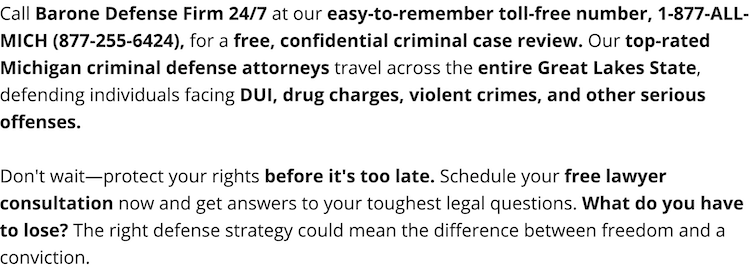OWI Drugs Charge Dismissed – Prescription Use Proven in West Michigan
The DUI defense attorneys at the Barone Defense Firm recently achieved success for another client in West Michigan. The original charge was Operating Under the Influence of Drugs. Our client, an elderly gentleman from Indiana, was trying to get onto I-94 and find his way home after a night at the casino. He accidentally went the wrong way on an entrance ramp onto I-94. Understandably, he was pulled over by a police officer.
Even though our client told the officer that he had not been drinking, the officer immediately suspected impaired driving because of the way he was driving and because of a urination stain on his pants. The officer asked our client to exit his vehicle and administered Standardized Field Sobriety Tests- the horizontal gaze nystagmus test and the walk and turn. In the officer’s opinion, our client failed those tests. The preliminary breath test result was .000 because our client had not consumed alcohol.
The officer put our client under arrest, suspecting he was on drugs of some kind. It was not until after arrest that the officer searched our client’s vehicle and found his prescription drugs- Hydrocodone and Xanax. Also after the arrest, the officer put in his report that he called a Drug Recognition Expert (DRE) officer to do an investigation of our client to determine whether drugs were in his system. When this occurs, a separate DRE report completed by the DRE officer is supposed to be included with the police report. However, no such DRE report was included. To obtain proof that it was in our client’s body at the time of driving, the officer obtained a blood sample from our client.
Upon doing a complete discovery and reviewing all evidence, including the blood sample report from the Michigan State Police Forensics Lab, it was revealed that the level of Hydrocodone and Xanax in our client’s body was within the therapeutic range of each prescription. Therapeutic range means the amount of the drug that the patient is supposed to take to treat the condition for which the drug is prescribed. In other words, our client was not taking more than prescribed to him (i.e., he was not abusing the drugs).
To supplement our argument that our client was taking his prescriptions to get high, the assigned attorney on the case, Michael Boyle, obtained from our client’s doctor a letter stating that the drugs taken were indeed prescribed by the doctor, our client had never abused his prescriptions, the doctor closely monitored this patient/our client and his prescriptions, and that the amount of drugs that showed up in the blood test was not enough to impair our client’s ability to operate a motor vehicle.
During pretrial negotiations, Mr. Boyle presented this information and his arguments to the prosecutor. The prosecutor agreed to dismiss the case because a DRE report was not completed and because of the information Mr. Boyle presented about the prescriptions showing that our client was not impaired by his prescriptions.
Thanks to Mr. Boyle’s zealous advocacy, our client retained his clean record and his Indiana driver’s license did not get suspended, allowing him to continue getting to and from his doctor appointments.
 Barone Defense Firm Home
Barone Defense Firm Home
















